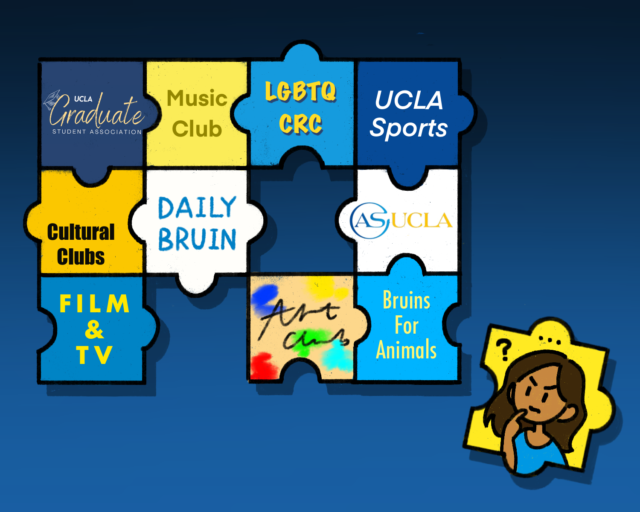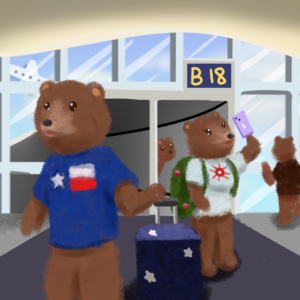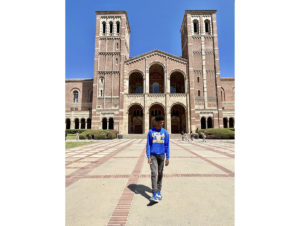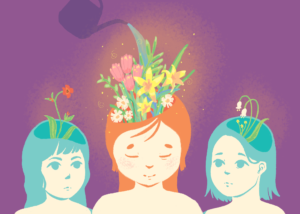This post was updated April 9 at 10:03 p.m.
Entering a university for the first time – especially one with a population as large and diverse as UCLA’s – presents various opportunities to explore adulthood through a new lens. Yet, the process of doing so comes with a few bumps along the way, including the struggle to find a community in a school that appears to possess infinite options.
Upon opening my acceptance letter, my heart stopped. Big blue letters filled the small phone screen, reading, “Congratulations! You’re #UCLABound.”
For that moment, and many afterward, my future felt like a real-life fairytale. The chance to study at a top-ranked university in the bustling city of Los Angeles seemed like an unbeatable opportunity.
However, despite the dreamy expectations I held, my fall quarter chose to weave a different story.
Many incoming students are greeted with a plethora of shiny promises when first entering UCLA. With its prestigious reputation, diverse demographics and an endless number of student organizations, one is easily led to believe that the school hosts a place for everyone.
This idealistic view of college life ultimately led to my profound disappointment and disillusionment at the start of my first year.
In the back of my mind, I made the simple assumption that there was a preexisting niche for me on campus. All I had to do was put myself out there, and it would not be long before I found my place of belonging in this new social world.
However, regardless of the number of club rush events I attended, the student organizations I attempted to join and the new relationships I cultivated, I was unable to develop a deeper connection with my environment. In the excitement of exploring my place in the university, I failed to acknowledge that my sense of connection may not click instantaneously.
The pattern of difficult first-year college transitions extends beyond UCLA and can be attributed to a nationwide and even global phenomenon. A 2017 survey by the American College Health Association found over 63% of students felt “very lonely,” and only 20% reported never feeling lonely. The trend continues when evaluating students abroad. In 2018, the International Journal of Environmental Research and Public Health found that 35.6% of students in Germany felt moderate to severe loneliness upon transitioning to university.
Similarly, studies indicate that the post-pandemic world has witnessed an exacerbated sentiment of loneliness among college students. According to a 2023 Meta-Gallup survey, over half of adult respondents globally felt “a little lonely” or “very/fairly lonely.” The study also notes that reported loneliness is much higher among younger adults compared to older adults.
My inability to create an immediate spark with the campus community felt emotionally crushing as if it was a personal failure driven by my perceived social ineptitude. Waves of social media posts depicting students experiencing idealistic college lives only worsened the growing weight on my chest.
If UCLA supposedly offered a niche for all students, and I continuously fell short in discovering mine, I was led to believe the issue lay within me.
However, as winter quarter rolled around – a time notorious for being socially dead – new developments started to offer hope for my situation.
Many of my friends, who appeared to lead bustling social lives during their first quarter, slowly revealed that their initial campus communities did not turn out as socially promising as they had anticipated. The wave of disillusionment that hit me in fall quarter began to dawn upon them, leading to a rather significant realization.
The social issue had never laid within me but in my mentality.
Throughout my fall quarter, I witnessed what I believed to be my peers conveniently finding their niches before me. On the contrary, that phenomenon turned out to be an infatuation, a result of their excitement of beginning college. Their lack of a deeper sense of connection with certain social groups eventually revealed itself in our second quarter, when so-called niches failed to retain student interest.
Although some students may find their belonging by attending traditional means of club rushes and freshman events, the sensation of campus connectedness also sneaks up in unexpected ways.
For instance, ironically, I developed a sense of community among my fellow peers who shared a lack of one. I met new students who were from my hometown, and they understood the process of adjusting to college at a slower pace while watching their other high school friends seemingly thrive. Similarly, through occasional run-ins at lectures, I reconnected with peers I met at freshman orientation.
My sense of belonging developed as I gradually placed less pressure on myself to attend one social event after another and accepted that my timeline for settling into college was not entirely in my control. Likewise, I realized that attempting to force a sense of belonging worked to repel me from achieving that very expectation. Ultimately, following my own interests slowly led me to others who shared my ideas and experiences.
I learned that the hard-set expectation of joining a new university, finding oneself and discovering one’s place in an enormous educational environment can serve to be socially destructive.
In truth, strong and stable bonds take years to build – not 10 weeks saturated with every imaginable social event. As I approach the next few quarters of my UCLA career, I do so without the expectation of finding my niche but rather with a sense of contentment.
I found peace in realizing that I will discover valuable connections by releasing myself from resolute social timelines and relying on my interests to guide me toward authentic relationships.






Comments are closed.